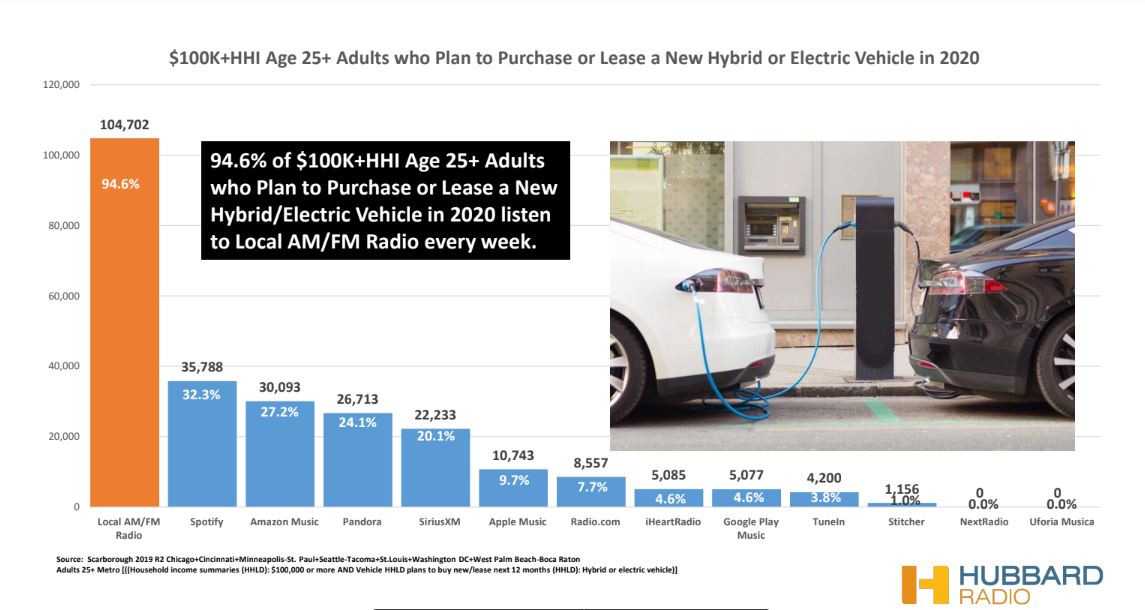
(By Mike Bustell) I try to keep my head down and quietly work behind the scenes helping our salespeople make a killing for our advertisers and our company. However, I had to react to Roger Lanctot’s “Technology Tyranny and the End of Radio” LinkedIn article published in last Friday’s Radio Ink headlines.
How Tesla and Silicon Valley (and other tech giants) feel about local radio is not much different than what our salespeople hear when talking with their local garden center or auto dealer group — that local radio is no longer relevant to bother putting it on their 2020 dashboards.
All these objections are happy opportunities to educate, bond, and sway hearts, minds, and advertising budgets. We have to be happy well-armed warriors with targeted customer-specific information every time we ask for a decision-maker’s valuable time. Once we earn an advertiser’s business we can never stop educating, bonding, or working on helping them grow their business.
Below is the most up-to-date look at the audio sources that $100K+HHI purchasers and lessees for new hybrid and electric vehicles are using. Like Mike Bloomberg taking the salt shakers off of New York City restaurants’ tables, Tesla’s removing easy access to local AM/FM radio stations on their new vehicles’ dashboards shows a similar out-of-touch-with-the-people attitude. Ninety-four and a half percent of $100K+ Age 25+ adults who plan to buy or lease a new hybrid or electric vehicle in 2020 listen to Local AM/FM radio every week — nearly three times that of Spotify, the second most-listened-to audio source every week used by these consumers.

No AM/FM radio in a new Tesla? That’s ok. Like candidates to vote for in a primary, buyers or lessees of new 2020 electrics can vote with their wallets and drive off the lot in a new 2020 electric Chevrolet, Jaguar, Nissan, Hyundai, or KIA — all of which have both FM and AM. These automakers have figured out the technology to eliminate electrical interference noise caused by their vehicles’ electric motors. So, if I am an auto industry person trying to sell more electric vehicles, and I’ve got 94.5% of prospective customers wanting to listen to local AM/FM radio, and 24.1% wanting to listen to Pandora, how am I serving the shareholders by eliminating local AM/FM Radio from my vehicles? Arrogantly ignoring these voters (AM/FM radio-listening buyers) could make my electric brand “yesterday’s news.”
With this attitude my grandkids will grow up thinking that Tesla is an autonomous 18-wheeler truck brand and tunnel-building company and not a self-driving passenger vehicle brand, as we let our autonomous KIA cruise us to the beach listening to my favorite local station.
If in the year 2020 we find that 19 out of 20 buyers of the most-sophisticated new autos on the planet are listening to local radio, imagine how strong local radio would be when you show a similar story of audio usage to your local garden center or Ford dealership.
Listening to and reading all these stories about the “end of radio” is like listening to and reading stories that the Corona (COVID-19) virus is going to wipe us all out. Seriously? For 100 years local radio has proven that it has the best “immune system” of any media out there and we will keep that 90+% reach as long as we keep being LOCAL radio — your daily companion that knows and lives in your hometown.
Mike Bustell is VP Market Research, Hubbard Radio. Email him at [email protected]






Why would anyone listen to local radio stations for content? At most you get 15-20 minutes of content(and im being generous) per hour of listening. You are then blessed with 40-45 minutes of most inane commercials ever to curse human ears ” HI IM MARK SPAIN AND ITS SCARRY TO SELL YOUR HOUSE!” . If you listen to a morning show of chortling haha’s and yahoo artist laughing at their own vomit and fart jokes you have to have brain damage and should not be allowed to operate a motor vehicle. Id gladly pay for music or better yet listen to music in my car for free on Pandora or spotify …even with commercials it is head and shoulders better than terrestrial radio.
Try this experiment…get in your satellite radio equipped and subscribed car, turn on the radio, and punch between satellite and FM. If your car is like mine (Prius), the satellite signal blows away the FM. There’s just no comparison. And there’s no commercials either.
The Radio industry needs to get real, and real fast.
Except you get a monthly bill. I’ll gladly drop all commercials if all my listeners will give me their credit card numbers. We do that in public radio and we find only 7% will pay because they know they can steal. It’s harder to steal satellite radio service. This is what we mean by technological tyranny. The high tech companies get your personal data, your money, and they use passwords to control the market. That doesn’t happen in FM.
if i have the choice between paying for 10-15 songs an hour with minimal commercials or listening to 3 songs an hour and the worst commercials yammered ill gladly pay and DO. As far as “stealing” publicly funded NPR well, i pay my taxes and never get a refund and owe NPR not a red cent. But its nice to know what you think of 93% of the general public. Hope those 7% abandon you for your entitled attitude.
I had the pleasure of working alongside Mike Bustell for 12 years (before he moved to Hubbard, and I founded New Ad Revenue). I was glad to see his commentary today.
This is exactly the kind of insightful, to-the-point analysis he’s given media and marketers his whole career. Factual and data driven, relentlessly delivered with passion and humor. I learned a lot making calls and presentations with Mike. Kudos to Hubbard for striving to be the best, and for helping their sellers and advertising prospects better understand the unique power of radio.
Radio was big enough for long enough that hobbyists will keep it alive even after it’s no longer profitable. Ye whose site is on the least valuable land shall liveith longest.
“The best DEFENSE is a good OFFENSE”. That’s a slogan that’s been used for decades in a whole lot of scenarios. Spending time defending radio could be better spent by creating a great offense -that right now radio’s not doing. Who’s marketing their products? Spotify, Pandora, Apple Music, the podcast world. A huge number of digital services. Even the largest radio company in the US is making a big deal out of podcasts. Who’s promoting AM/FM radio? (Crickets?) No, radio’s not dead. Right now it’s being overshadowed by the digital buzz. If radio’s not in your next car, who to blame? Radio! You think Apple CarPlay is on a dashboard for free? Toyota has “Entune” a service that streams digital content-and it’s a subscription service. There are many more and each and most are tied to increasing revenue. Is broadcast radio lobbying car makers? We don’t hear about it if it is. AM/FM still has benefits over digital but we keep zeroing in on the drawbacks rather than fixing them. I love that Mike is so bullish on his product. He’s paid to be that way. I hope his company is that way as well and they can convince the other big companies to keep the playing field as level as possible. A good offense. No, a GREAT offense. AM/FM is still immediate, easy to use and free.
Spoke last week to five US history classes at our local high school. Freshmen and Sophomores. Took a show of hands on how many listen to local radio as opposed to newspaper and on line. Everyone raised their hand with on line. One per class raised their hand for newspaper. About 2/3 raised their hands consistently for local radio in each class. Call me optimistic as a radio group owner! Besides where are local small business people going to promote themselves? In the disagreeable cesspool known as Social Media? Yeah that’s a great place to brand a business. Like everything else, good operators will do well and bad ones won’t.
Not listening to radio is more a function of your age and experience than anything having to do with radio itself. The 500 songs wouldn’t be “tired” if they’re all currents and if they’re your favorites. Young people have access to new technology, but they also have respect for heritage. They don’t have any preconceptions or biases against radio. If they can hear what they want, they’re OK with it. The radio station doesn’t ask for their credit card number, doesn’t ask for personal information, and doesn’t require a subscription. All of that is good. The fact that young people use radio as ONE of their sources shows there is a future as long as radio continues to adapt.
Very well put, BigA.
Dave “doth protest too much”…especially for someone who says he works in the business…one that he doesn’t believe in??? Hmm…
I believe in it. But I’m also a realist. But if you all want to just keep doing what you are doing and expect to survive, be my guest.
This is the old “glass half empty or glass half full” scenario. With all the digital media available, radio stations have more opportunities than ever to reach an audience. On the broadcast side, smaller market, local stations are a valuable tool for informing and entertaining the community. “The reports of my death have been greatly exaggerated “
Broadcast radio is 100 years old, this year. The industry is not without its challenges, but, as you allude to, Jim, how many times has local, broadcast radio been declared dead or dying??? Somehow, it uses its strengths to keep resurrecting itself, as compared to other legacy media…
There may be some people who will buy a car with “NO RADIO” most people will say not on your life and not even listen to your explanation that this massive entertainment system is so good you will not want radio. People will return a Cadillac to the dealer if it won’t hear their favorite station! It has happened!
Great read, Mike! Thank you for all that you provide to our advertisers to keep their business growing.
This reminds me of the Internet meme with the dog sitting in a burning room saying “everything is fine!”
You must be commenting on a different conversation, Dave. The author, Mr. Bustell, very much acknowledges and speaks to the everyday challenges that broadcast radio faces, whether it’s with (potential) advertisers, car companies or other relevant parties. Believe me, from both programming and sales standpoints, local radio broadcasters fight on a daily basis to make ends meet, and to best serve the needs of clients. You are too dismissive in your breezy comment.
Too breezy? Ok… I’ll be more specific for you.
As the Boomer generation dies out, so will broadcast radio.
I work in commercial radio, and can’t remember the last time I listened to it. With affordable and reliable unlimited cellular data I can now listen to exactly the news and music entertainment I want to. I no longer need the local station to force feed me the same 500 tired songs and management-biased news they deem broadcastable.
“You’ll never go wrong playing the hits”…. but you will eventually go broke. In the technology age we have today, there is little to no need for broadcast radio. And the younger generations know it.
Enjoy it while it lasts.